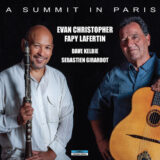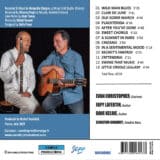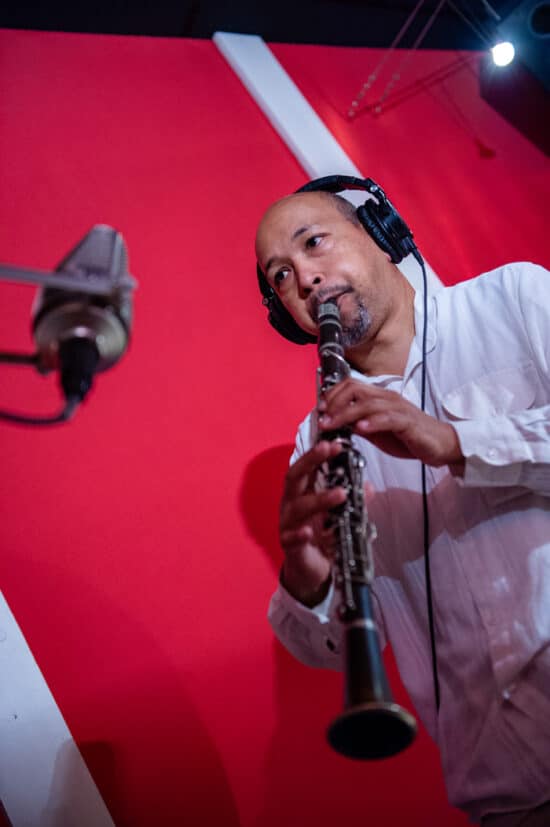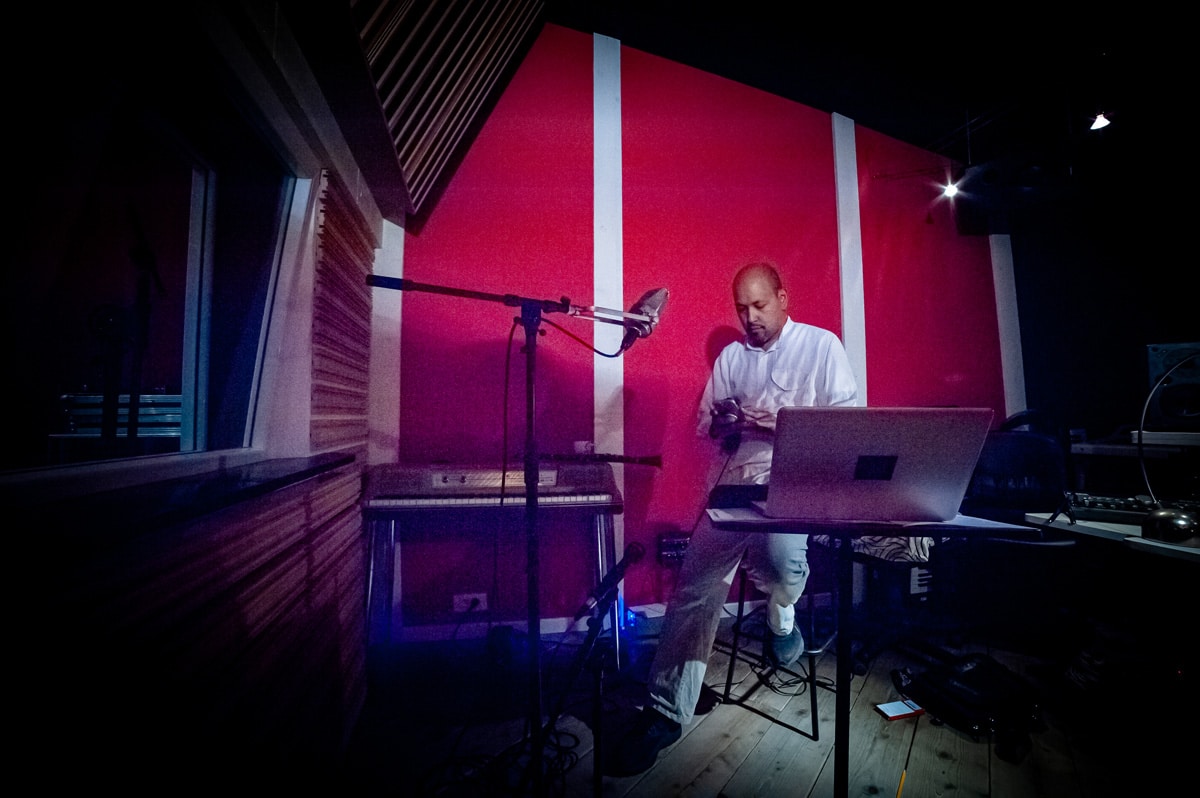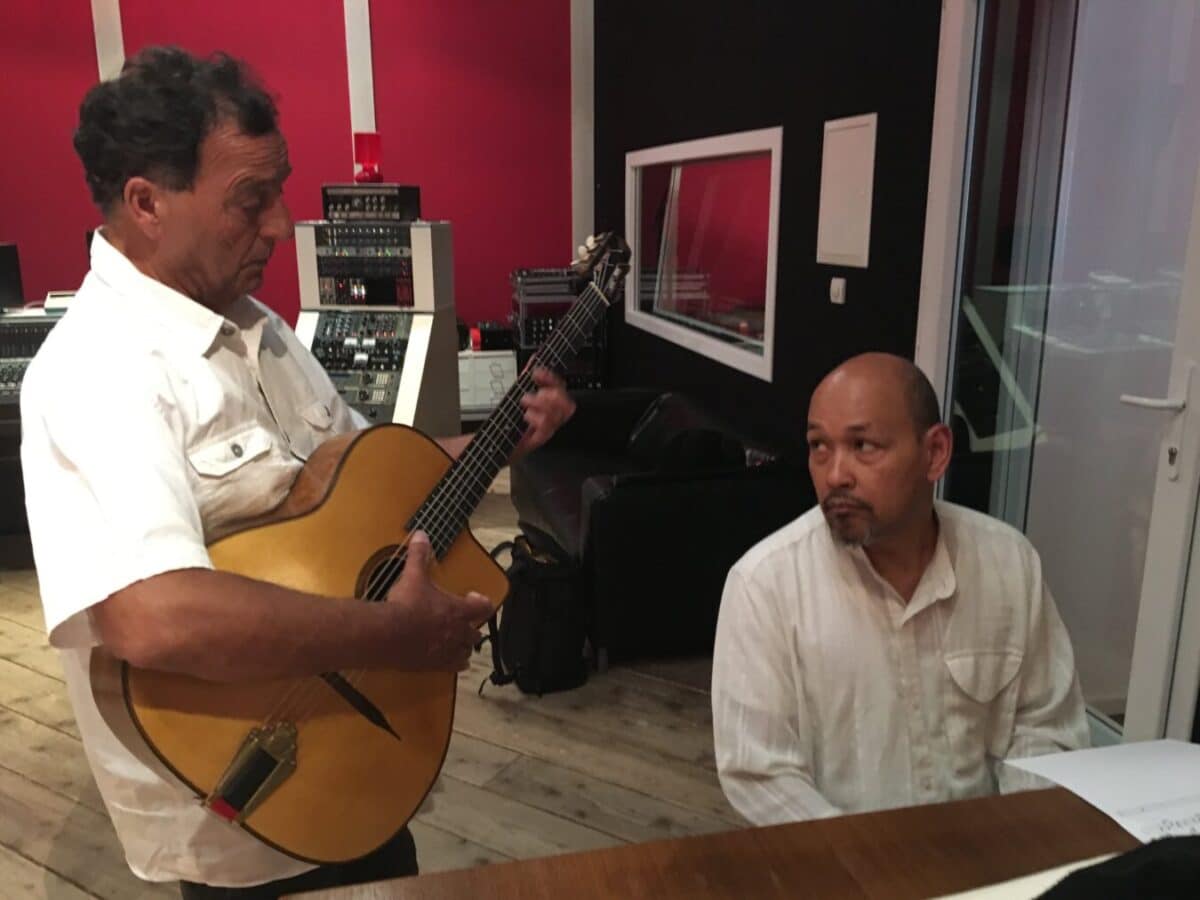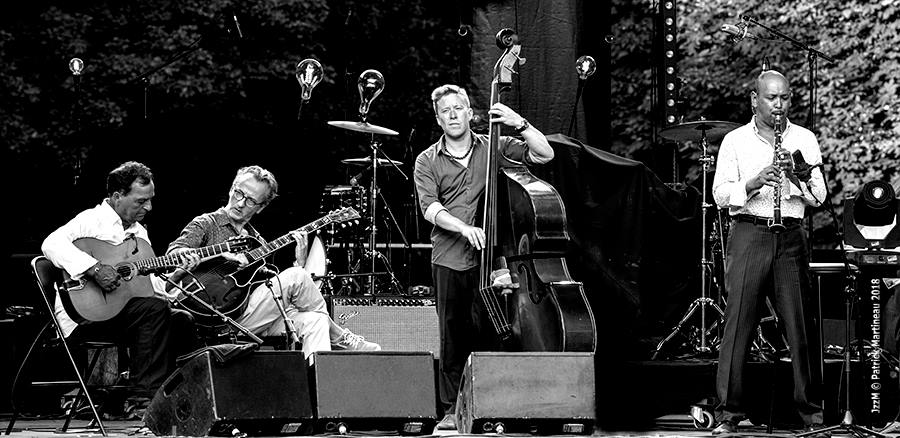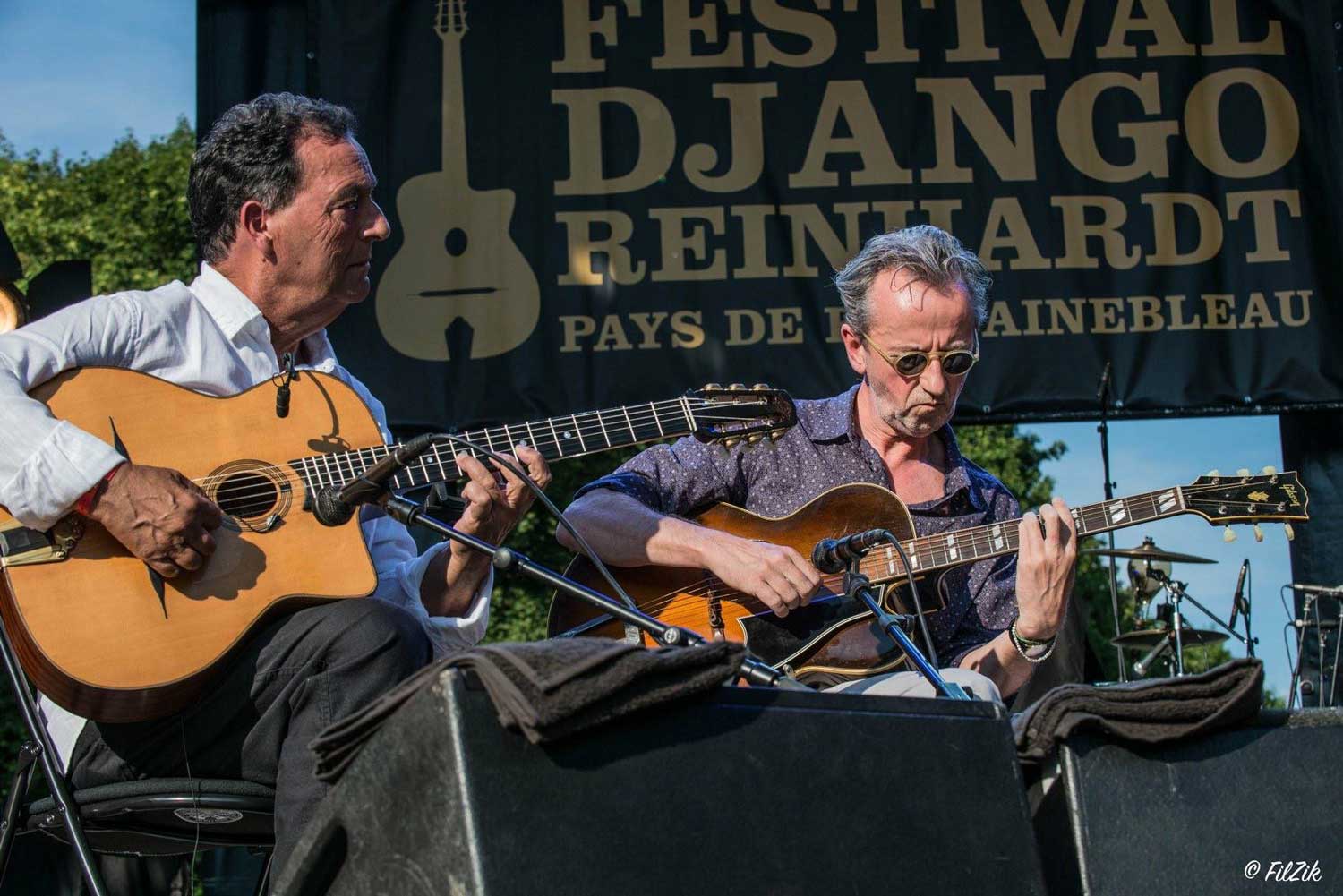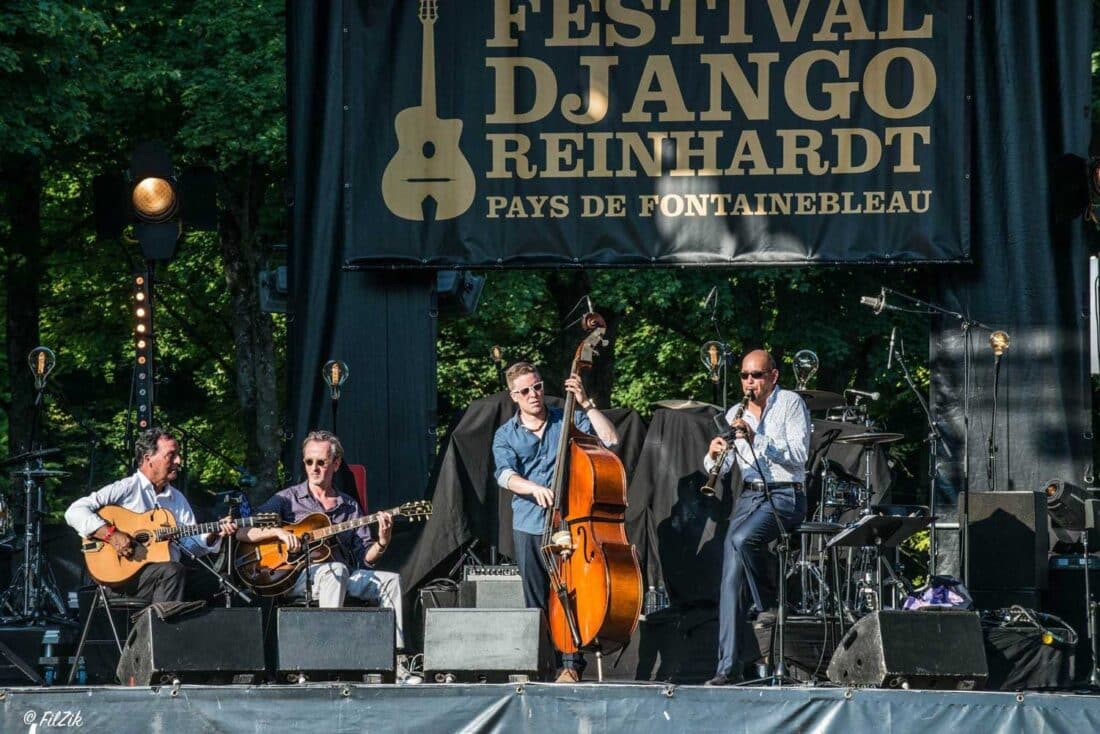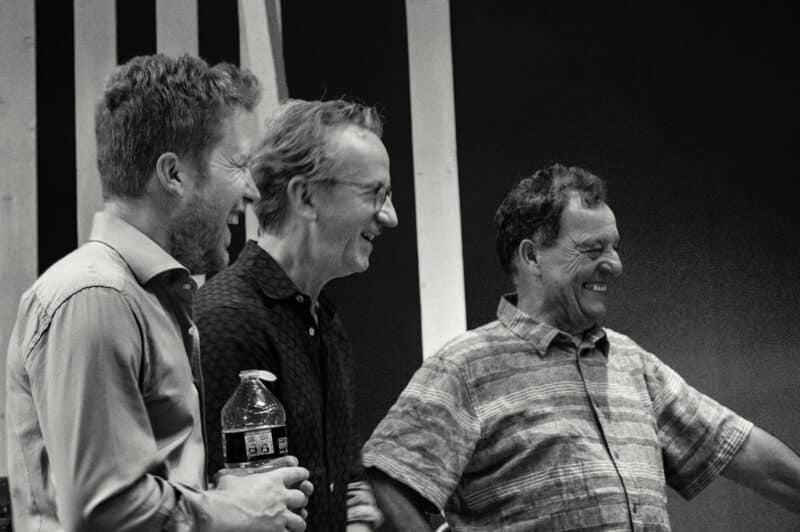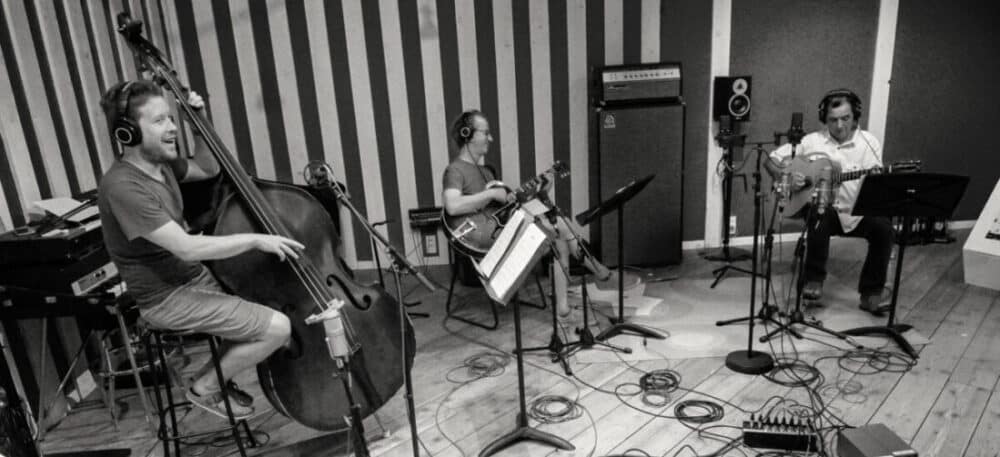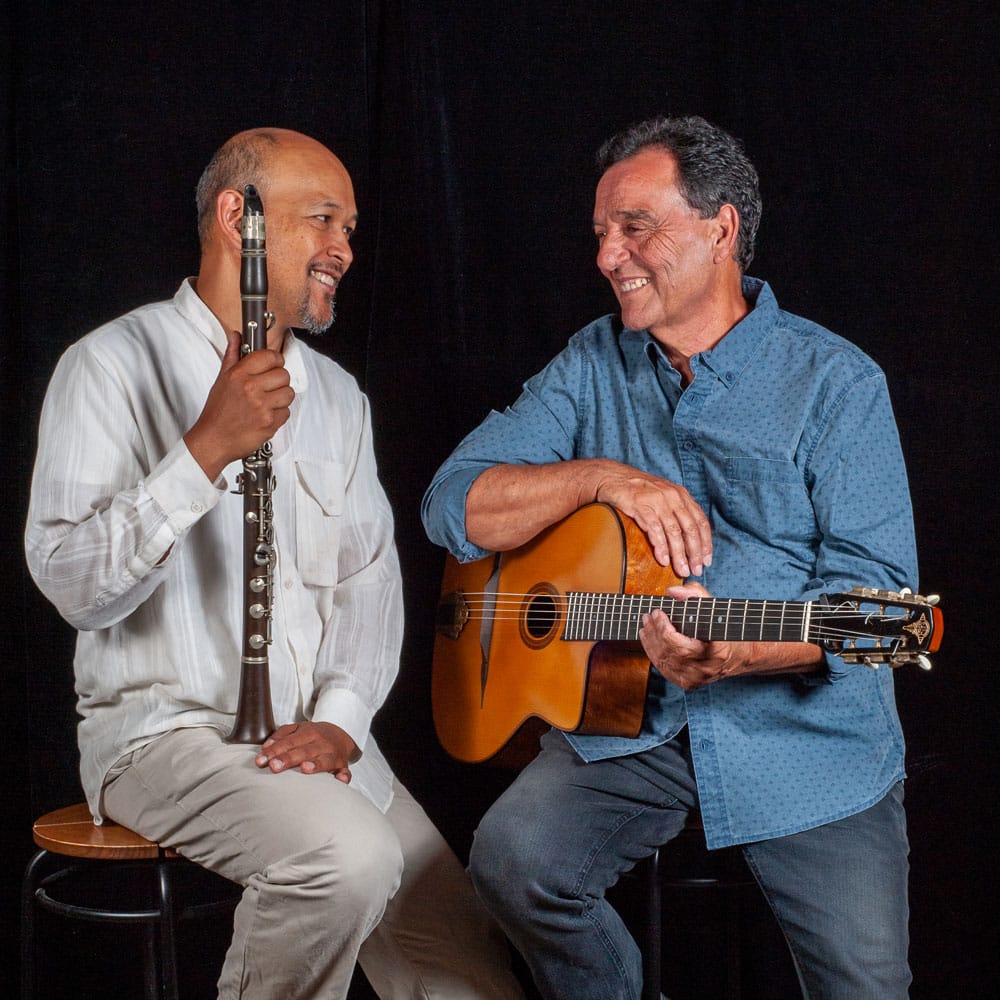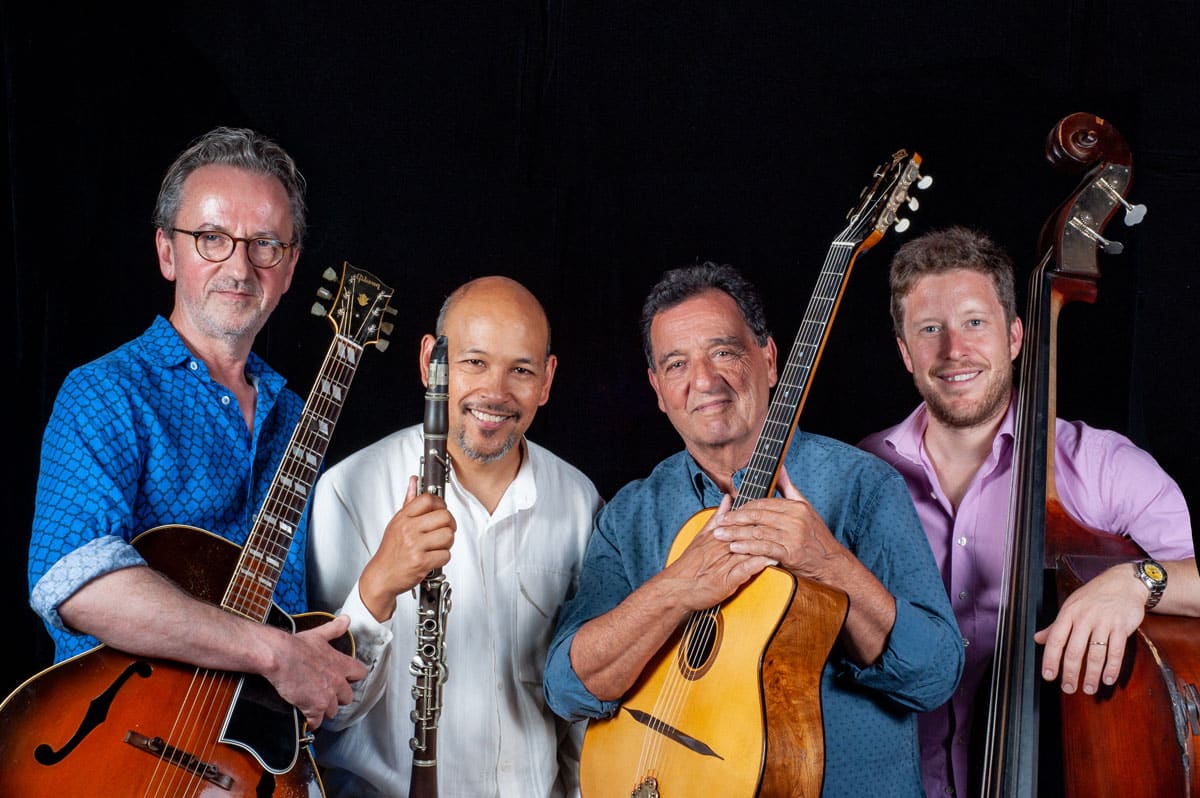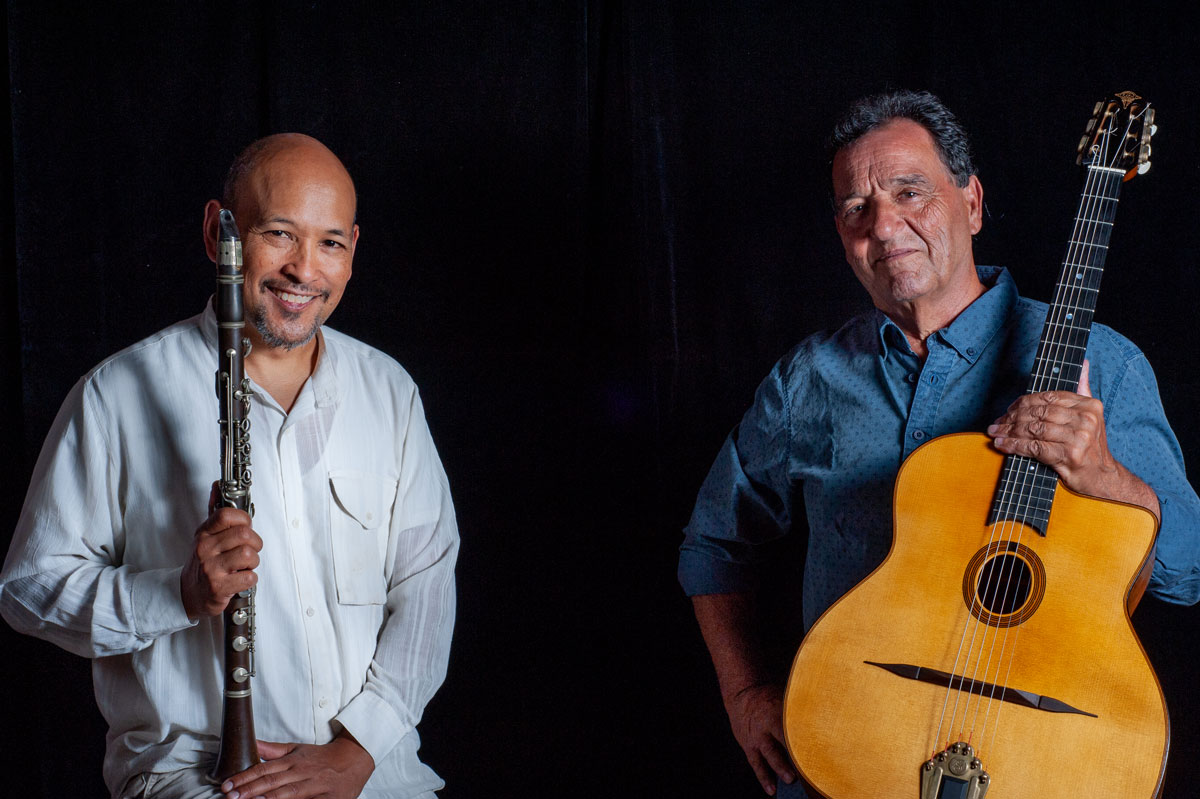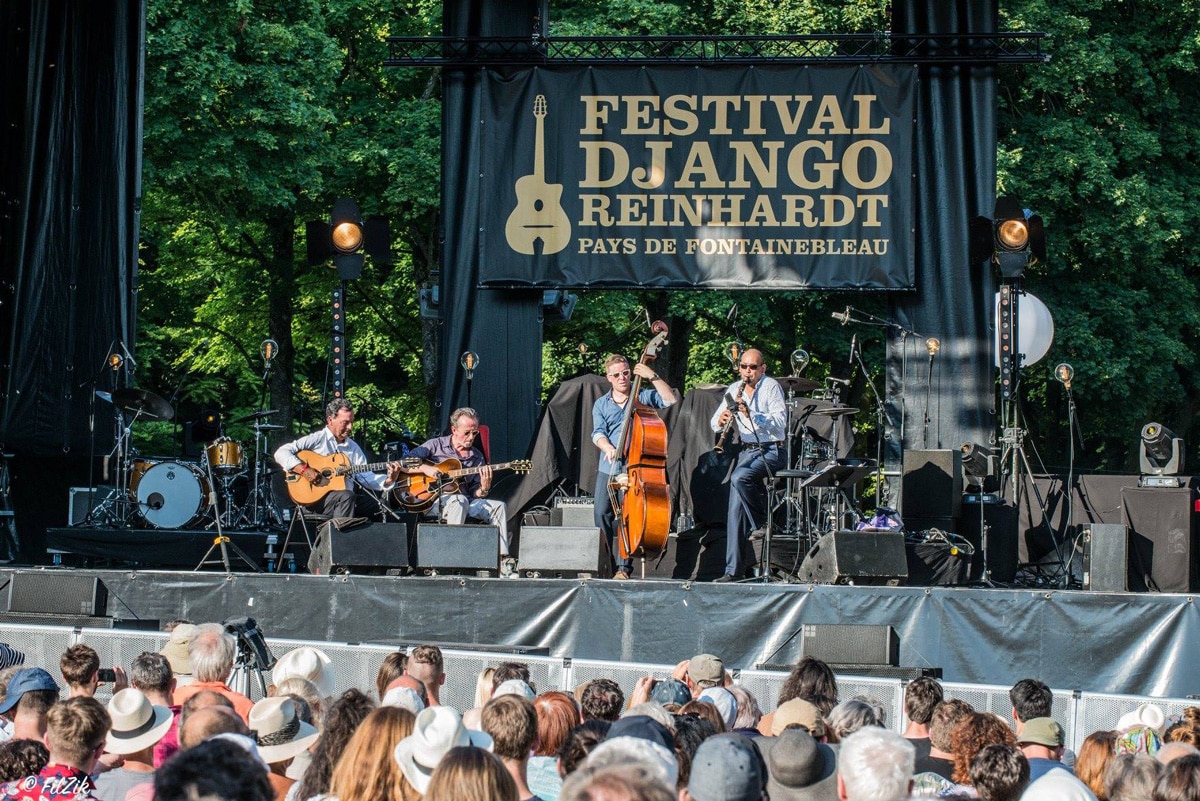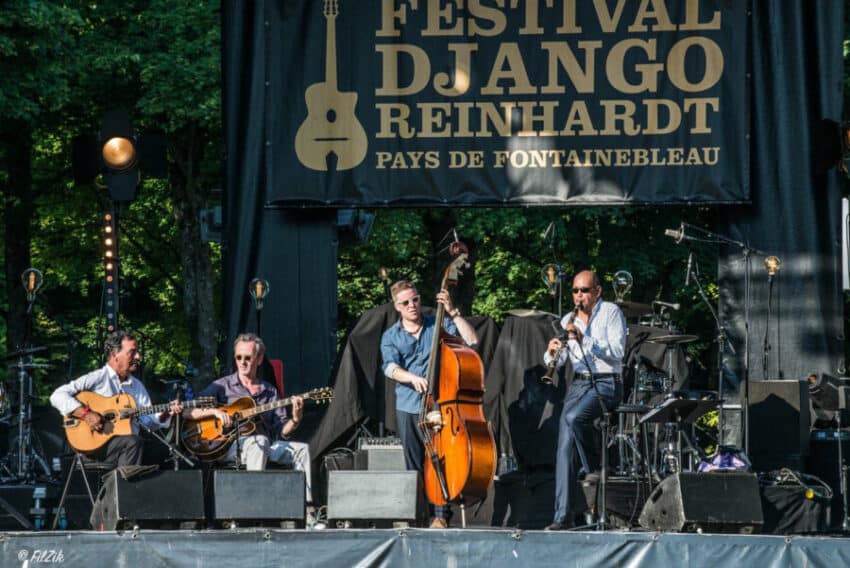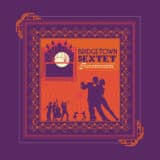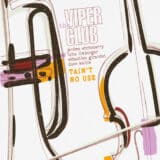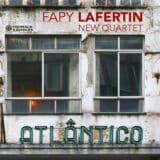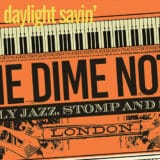Evan Christopher – Fapy Lafertin Quartet
TWO GREATS FROM EITHER SIDE OF THE ATLANTIC
Evan Christopher and Fapy Lafertin have received accolades the world over. Not just through their musicianship, both are considered true ambassadors for their music, nurturing the musical traditions that have played an essential part of their respective cultures. Lafertin is an institution! Studied by many and widely thought of as the rightful heir to Django’s crown. Christopher, a powerhouse of sound, swing and invention.
The new CD materialised from a much acclaimed concert at the Festival Django Reinhardt south of Paris in 2018. It includes tunes from that performance such as J’attendrai, Wild Man Blues, In a sentimental Mood and After you’ve gone alongside compositions of Evan Christopher Old Sober March, and A Summit in Paris and Lafertin’s Cinzano and Plachterida.
Rhythm section is Dave Kelbie on guitar and Sebastien Girardot on bass, accompanists to many in the jazz and Gypsy jazz world, Django a la Creole, John Etheridge, Tcha Limberger, Mozes Rosenberg amongst others.
EVAN CHRISTOPHER – Clarinet
FAPY LAFERTIN – Guitar
DAVE KELBIE – Guitar
SEBASTIEN GIRARDOT – Double Bass
EVAN CHRISTOPHER AND FAPY LAFERTIN TRACKLISTS & RECORDINGS
PRESS
No Events
REVIEWS
ALBUM REVIEW. LE SOUFFLE BLEU FR 31.08.2020
Clarinette et jazz manouche
Evan Christopher a décidé un jour de mettre sa clarinette au service du jazz manouche pour lui donner une nouvelle jeunesse et éviter la répétition des motifs forgés par Django Reinhardt qui reste, malgré tout, la référence essentielle. Il faut rendre au créateur ce qui lui revient, d’autant que Django avait utilisé la clarinette dans le quintet qu’il avait créé pendant la guerre. Fapy Lafertin, guitare, avec qui le clarinettiste partage l’affiche de l’album intitulé en toute modestie « A Summit in Paris », sait se servir des leçons du maître pour créer des ambiances spécifiques. Un sommet qui réunit aussi Dave Kelbie, deuxième guitare, et Sébastien Girardot, contrebassiste, deux autres habitués de l’univers de Django.
Le quartet dessine l’environnement de Django en reprenant des classiques comme « Wild Man Blues », repris par Louis Armstrong à la fin des années 1920, qui ouvre l’album ou « Bechet’s Fantasy » que Sidney avait enregistré seul, s’enregistrant sur tous les instruments pour mêlées les compositions de Django, compositions personnelles et construire un album sans fausse note…d’ambiance. Une musique irrésistible dans sa manière d’agencer les instruments et les souvenirs pour dessiner le présent de cette musique.
NICOLAS BENIES
ALBUM REVIEW. JAZZ DA GAMA CANADA 22.03.2020
Evan Christopher-Fapy Lafertin. A Summit in Paris
The recording A Summit in Paris brings together four of the most important musicians in a two important modern styles of music: Créole-Jazz and Gypsy-Jazz – further proof that while Jazz may have been pioneered by the Black musician, it has since become the root of one of the largest and most wondrous tree of music. These are inimitable clarinettist Evan Christopher together with the greatest manouche guitarist since Django Reinhardt, Fapy Lafertin together with the British guitarist Dave Kelbie, one of the great evangelising figures in the European branch of Jazz and Gypsy-Jazz and Sébastien Giradot, a French-Australian contrabassist with an unique voice in Jazz. Their breathtaking repertoire – which we experience on this disc – is an exceptionally vivid and visceral example of what we recognise as a collision of both Créole-Jazz and Gypsy-Jazz.
The term créole may have been originally used by French settlers in Louisiana but the diaspora of créolite peoples is much more diverse. A term (expanded from the word) the term Créoles de la Louisiane used to distinguish French settlers born in “The New World” from those born in France and Criollos de Luisiana to refer to those of Spanish origin. Soon (after the Haitian Revolution of 1791-1804) thousands of refugees (both whites and free people of color from Saint-Domingue (affranchis or gens de couleur libres) arrived in New Orleans. Germans and Italians also feature in the mix, as well as the pervasive influence of the Indigenous American; all of whose cultures contributed to the strong tradition of marching bands as well as other traditional music.
The spark that ignited the music of New Orleans came from the African population of Louisiana. The near-mythical collisions of Sundays in Congo Square in New Orleans gave rise to the Blues and begat Jazz. But the strong créole influence throughout the region gave rise to a style now called zydeco and this Gumbo of New Orleans music informed the music of the earliest pioneers; Jelly Roll Morton, Sidney Bechet, Kid Ory, Barney Bigard, Danny Barker, Albert Nicholas, and Pops Foster, to name a few.
The incomparable Evan Christopher comes from the long line of maverick clarinettists that also included perhaps the greatest of these pioneering clarinettists: George Lewis, Albert Nicholas and Sidney Bechet. The latter (who switched to soprano later on in his career) moved to France and was one of the first musicians to carry the Gospel of Jazz overseas, becoming one of its greatest evangelists. It was evangelists such as Mr Bechet that deeply influenced the music of Django Reinhardt – himself a pioneer (along with Pioto Limberger) of what has now become accepted as the European root of the music called Gypsy-Jazz. For his part, Fapy Lafertin is considered to be a direct descendent of Mr Reinhardt and is – with Vivi Limberger, Koen De Kauter, the prodigious Biréli Lagrène and Mozes Rosenberg – the greatest exponent of the so-called Gypsy-Jazz.
Paris would be one of the most appropriate cities for a collision of Créole-Jazz and Gypsy-Jazz and the recording A Summit in Paris has captured just that for all time in a superbly executed (both musically and technically musically) and invaluable document. It is also one of the most breathtaking displays of musicianship on the part of each of the artists on disc. Documentarily, this repertoire represents a perfect storm of how Jazz exploded in the pressure-cooker of early 20th century music that rained down on the broader universe of music. The quartet interprets such classic songs as “Wild Man Blues” and “Swing That Music” written by Louis Armstrong and “Bechet’s Fantasy” and “Little Creole Fantasy” by Sidney Bechet. This is music that was created – and characterises – the shuffling, swinging effervescence earliest days of the Jazz.
Mr Christopher’s playing on his own compositions especially “Old Soldier March”, a superb reflection of the music of his beloved New Orleans, is gloriously vivid. His phrases float luminously over the guitar of the Mr Lafertin, who employs spiky, syncopated rhythms and an abundance of ostinati, both coming together to create airiness and a feeling of enormous space and nearly indescribable beauty. Mr Christopher’s playing is brilliant and persuasive throughout – completely unique among clarinet players including among such virtuosos as disparate in style as Eddie Daniels is from Paquito D’Rivera. Mr Lafertin’s lines are beautifully florid, clean-coloured, deeply imaginative and theatrical. For a special treat you might listen to the brief but brilliant “Cinzano”, a work composed by Mr Lafertin (no less).
The playing of both Dave Kelbie and Sébastien Giradot – rhythm guitarist and contrabassist – is sparkling and idiomatic. Mr Kelbie is probably the only guitarist playing today who makes the drummer completely unnecessary (something that I suspect goes way beyond small ensemble like this one). His sense of time is flawless. But what he also does – and this is something that’s often overlooked because of his ability to play “perfect time” is how he mixes up his harmonics, alternating between familiar and unfamiliar and diabolically difficult ones, dropping them unexpectedly into very dissonant passages, making them sound so fresh and new. And Sébastien Giradot does likewise with his contrabass lines. Together, the two men seem to even obviate the necessity of piano in an ensemble. In fact it’s hard to imagine an ensemble without these two men completing there to close the musical circle.
Playing together as they do it’s hard to recall a better recording in recent memory with music played so eloquently and exquisitely as to convey the dynamic and fluid inner pulse of both Créole-Jazz and Gypsy-Jazz – characteristics that, in fact, inform all of Jazz itself.
Track list – 1: Wild Man Blues; 2: Clair de Lune; 3: Old Sober March; 4: Plachterida; 5: After You’ve Gone; 6: Sweet Chorus; 7: A Summit in Paris; 8: Cinzano; 9: In a Sentimental Mood; 10: Bechet’s Mood; 11: J’Attendrai; 12: Swing That Music; 13: Little Créole Lullaby
Personnel – Evan Christopher: clarinet; Fapy Lafertin: guitar; Dave Kelbie: guitar; Sébastien Giradot: contrabass
Released – 2020
Label – Camille Productions (MS072019CD)
Runtime – 1:06:19
RAUL DA GAMA
ALBUM REVIEW – BULLETIN DU HOT CLUB DE FRANCE FR 06.02.2020
Evan Christopher-Fapy Lafertin. A Summit in Paris
Installé sur une rythmique vigoureuse d’origine I australienne, ce mariage manouchocréole ou créolomanouche, comme on voudra, est parfaitement réussi. La formule n’était pourtant pas évidente et aurait pu juste aboutir à l’une de ces innombrables « musiques métisses » où s’agitent inlassablement carpes et lapins dans une sauce à la mode, sans qu’il pousse pour autant des ouïes aux lapins ou des oreilles aux carpes. Pauvres bêtes…
Créole et manouche : à première vue, il s’agit de deux cultures séparées par un océan et de deux histoires qui n’ont rien à voir l’une avec l’autre. C’est le jazz qui va les fusionner, ce grand fédérateur capable de lier toutes les sauces à partir du moment où les éléments proposés lui sont compatibles.
Le premier point est évidemment la qualité de la rythmique. La basse de Sébastien Girardot et la guitare de Dave Kelbie sont bien en phase et le swing est là, souvent en ‘bounce’, car on n’est pas systématiquement ici dans la pulsation qui marque la branche manouche du jazz – il faut que Fapy Lafertin vienne s’en mêler pour qu’apparaisse de temps en temps cette nuance-ià.
Fapy Lafertin, lui, c’est un vrai représentant de l’école Django. D’ailleurs, il se situe dans la parentèle des Ferret… autant dire qu’il fait partie de la famille. Naturellement, il fait penser à son plus illustre représentant, mais il ne s’agit pas d’une copie conforme : pour ma part, je trouve qu’il a une façon de jouer bien à lui, parfois marquée d’une certaine volubilité, et des références différentes.
À côté de toutes ces cordes, Evan Christopher sonne superbement. Je ne vais pas vous faire le coup (lieu commun d’origine œnologique) de la « sonorité boisée » de la clarinette, c’est d’ailleurs une sorte de pléonasme puisque, justement, c’est un instrument en bois (sauf pour Hugues Panassié et Jean-François Bonnel, adeptes de la clarinette en métal). Il est donc haute¬ment souhaitable que la sonorité d’une clarinette vienne tirer parti de la matière avec laquelle elle est fabriquée, et là, avec le son que tire Evan Christopher, aucun doute, d’autant qu’il s’agit d’un album particulièrement bien enregistré.
En matière de clarinette, difficile de faire plus créole ! C’est peut-être le moment de faire remarquer que, à de rarissimes exceptions près, cet instrument n’est vraiment chez lui que dans la chaleur haute en couleur de la musique néo-orléanaise. Il suffit d’entendre quelques notes d’Evan Christopher pour comprendre que, même d’origine non louisianaise (il est né en Californie), il se rattache à cette culture-là, à mon avis plutôt du côté Noone. Et puis la clarinette d’Evan Christopher possède une voix bien à elle et, à l’entendre, cette voix-là me rappelle beaucoup celle du bon docteur Michael White.
Pour moi, ce qui « fait » le disque et le rend passionnant à suivre, c’est la parfaite intrication du jeu des deux solistes, toujours très inspirés. Tout au long de l’album, qu’ils se placent en ‘Chase’ ou en contrepoint, ils sont hyper-compatibles, et c’est très étonnant de voir deux musiciens que tout ou presque devrait séparer faire preuve d’une telle connivence et prati¬quer le même langage.
Parmi les treize morceaux qui nous sont proposés, aucune plage faiblarde. En ce qui me concerne, j’ai particulièrement aimé Wild man blues, entrée en matière bien envoyée ; Clair de lune, morceau de Django, supérieurement mis en valeur tout à tour par les deux compères ; la composition d’Evan Christopher Old sober march, ficelée de première sur des harmonies rappelant celles de China boy ; Plachterida, jolie valse composée, elle, par Fapy Lafertin ; l’excellent Cinzano, également composé par le guitariste et dont le côté erratique très drôle évoque irrésistiblement l’embuscade et le coup de trop ; un superbe Bechet’s fantasy (compo¬sition du maître) ; et, vers la fin, le dynamique Swing that music sur tempo rapide.
La qualité de chacun et du travail commun comme celle de l’enregistrement font certaine¬ment de ce “A Summit in Paris” un album hautement recommandable !
LAURENT VERDEAUX
ALBUM REVIEW – CLASSICA FR 01.02.2020
Evan Christopher-Fapy Lafertin. A Summit in Paris
S’il est une clarinette qui pouvait se fondre avec un trio à cordes inspiré de la musique manouche, c’est bien celle d’Evan Christopher. Avec ce Summit in Paris où il dialogue avec Fapy Lafertin, les treize thèmes interprétés trouvent des couleurs chatoyantes et une sorte de grâce et de souplesse de fort belle venue. On appréciera en particulier « J’Attendrai », la chanson de Rina Ketty qu’illus¬tra aussi Dalida, qui trouve ici une dimension à laquelle on ne pouvait s’attendre.
JEAN-PIERRE JACKSON
ALBUM REVIEW – JAZZ MAGAZINE FR 30.01.2020
Evan Christopher-Fapy Lafertin. A Summit in Paris
Evan Christopher s’est impose en quelques annees comme I’un des musiciens qui ont su le mieux faire fructifier (‘heritage de La Nouvelle-Orleans. Non seulement il a reussi, par son phrase, son invention, sa sonorite, a faire revivre le style des grands ancotres de la clarinette, mais it l’a enrich), et etendu, en quelque sorte, le spectre de leur musique. En effet, nourri de la tradition creole, il a toujours manifesto un intoret pour les apports manouches, singulierement ceux de Django Reinhardt. En atteste son album “Django a In creole” (2009). Y figurait deja le solide contrebassiste Sebastien Girardot, que Ion retrouve ici aux cotes de Dave Kelbie, guitariste rythmique fort apprecie, et de Fapy Lafertin. De Ia cohorte des emules de Django, ce dernier emerge sans conteste. II temoigne d’une reelle originalite en ce qu’a (‘inverse de nombre de ceux-ci, it ne privilegie pas Ia virtuosite, mais s’attache plutot a construire des phrases oh la melodie se trouve mice en valour. In A Sentimental Mood offre un exemple de ce souci constant. Au menu, outre des standards signes Louis Armstrong ou Django Reinhardt, des compositions des deux leaders, cot album homogene, seduisant de bout en bout, apporte une nouvelle preuve de la pertinence d’une telle dernarche.
JACQUES ABOUCAYA
ALBUM REVIEW – OFFBEAT MAGAZINE USA 26.12.2019
Evan Christopher-Fapy Lafertin. A Summit in Paris
On A Summit in Paris clarinetist Evan Christopher joins his contemporary, early jazz stylings with the Django-worthy technique of guitarist Fapy Laftertin to honor both Reinhardt and several pioneers of early New Orleans jazz.
Both musicians are masters of their craft and deftly move through 13 songs chosen specifically to blend the influences of New Orleans’ early jazz legends with Django’s gypsy style. These include Louis Armstrong’s “Wild Man Blues” and “Swing That Music”; Sidney Bechet’s “Bechet’s Fantasy” and “Little Creole Lullaby”; the standards “In a Sentimental Mood” and “After You’ve Gone”; and Django’s own “Clair de Lune” and “Sweet Chorus.” They’ve also slipped in four original tunes: Christopher’s “Old Sober March” and “A Summit in Paris” as well as Lafertin’s “Cinzano” and “Plachterida.” Solidly backing the formidable duo are Sebastien Girardot on bass and Dave Kelbie on guitar.
Christopher and Lafertin have dedicated themselves to their respective stylistic influences and to great effect. On this album they impressively channel these legends of the past, creating for us the fantasy scenarios we can only dream of: Bechet with the manouches, Django in the Big Easy.
STACEY LEIGH BRIDEWELL
ALBUM REVIEW – JOURNAL DE LA VILLE DE BOULOGNE BILLANCOURT FR 05.03.2020
Evan Christopher-Fapy Lafertin. A Summit in Paris
LE CD JAZZ DU MOM A summit in Paris Avec la regularite d’un swing metronome, le label boulonnais Camille Productions continue a rythmer de jolies trouvailles le petit monde de la musique de jazz. Le producteur Michel Stochitch provoque ici Ia rencontre entre l’onctueux clarinettiste neo-orleanais Evan Christopher et le fin guitarists manouche Fapy Lafertin. Ces deux-la ne sont pas nes de la derniere pluie. Avec Dave Kelbie (guitare) et Sebastien Girardot (double basso), l’equipe scelle le manage du souffle discret de la Nouvelle-Orleans avec les cordes des fils du vent, dont Django Reinhardt fut (‘humble genie. C’est un disque epatant, doux, primesautier, sautillant, nostalgique, souriant, virtuoso mais sans esbrouffe, et respectueux des heritages.
C.DR
ALBUM REVIEW – SYNCOPATED TIMES 26.12.2019
Evan Christopher-Fapy Lafertin. A Summit in Paris
After Hurricane Katrina clarinetist Evan Christopher spent two years in Paris exploring the legacy of Django Reinhardt. The result was a band joining Christopher’s classic New Orleans jazz style, Gypsy jazz, and dashes of Caribbean flavor.
Django à la Créole was a phenomenon. Their 2008 album received rave reviews from all corners. Another album followed, and extensive touring produced a live set. All the while Christopher, who has been called one of the great jazz clarinetists of all time, maintained the New Orleans style of play in his other band, Clarinet Road. He was on our cover in August 2017.
This past July he was back in a Paris recording studio. The Reinhardt inspired lineup is the same as the previous albums with one tremendous exception, it’s the reason this album doesn’t wear the Django à la Créole name. Instead of guitarists Dave Blenkhorn or Don Vappie, who appeared previously, Christopher’s primary interlocutor is Fapy Lafertin.
To those who have never explored the Django revival this name may be unfamiliar. To those steeped in this music it won’t be. Lafertin was born in a Romani/Manouche community in Belgium and began learning guitar as soon as he could hold one. Since interest in Django Reinhardt began to flower in the 70s he’s been a leading guitarist in a movement where guitar is king. Some have said he surpasses Django himself, not only in technical skill, but in artistry.
The other members of this quartet are Dave Kelbie on rhythm guitar and Sebastion Girardot on double bass. Kelbie’s professional focus has been as an accompanist to great jazz soloists, and among many he has frequently partnered with Lafertin for over twenty years. Girardot is a member of Three Blind Mice, La Section Rythmique and several other steady groups. You couldn’t ask for a better support team.
The heart of this album is Christopher’s haunting clarinet playing. There is less fancy fretwork than you might expect, and it contains fewer fiery passages than the previous efforts, leaning more American and less Caribbean. The revelation is the beauty of clarinet over strings, and the compelling nature of the lead guitar, rarely heard outside of the French styles. If Sidney Bechet had recorded with Django’s trio while both were in France the result may have sounded something like this.
Part of the way the styles are merged is through track selections, much as might have happened in our fantasy meeting. Louis Armstrong is present in “Wild Man Blues” and “Swing That Music”. Two of the tracks are Bechet’s, “Little Creole Lullaby” and “Bechet’s Fantasy”. Only two of the titles are strongly associated with Django Reinhardt. The lean of the compositions towards New Orleans, or at least American jazz makes this a different animal from a typical hot club album. It’s all about the possibilities, the opportunity for exchange inherent in collective improvisation.
Christopher and Lafertin are a marvelous pairing, weaving and building counterpoints across jazz worlds. Each contributes two originals to this thirteen track album — over an hour of surprises. I recommend it to traditional jazz fans who seek to stick a toe in the water and explore the Jazz Manouche style, or those raised at Django festivals who want to ease themselves into trad jazz. While this summit may not tear you away from your favorite camp, it’s a worthy undertaking none the less.
JOE BEBCO
ALBUM REVIEW – JAZZ HOT 12.12.2019
Evan Christopher-Fapy Lafertin. A Summit in Paris Dans ce nouvel album Evan Christopher poursuit dans la lignée de son Django à la Créole (2008). Cette fois, c’est en compagnie d’un héritier de Django Reinhardt, Fapy Lafertin. On sait que Django avait remplacé le violon de Stéphane Grappelli par la clarinette d’Hubert Rostaing, Maurice Meunier ou Gérard Lévêcque. Pas d’hérésie donc! La rencontre Sidney Bechet-Django Reinhardt aurait pu se faire en 1949-53, d’autant plus que tous deux ont oeuvré pour le même label, Vogue. Fapy Lafertin (1950) est considéré comme l’un des principaux représentants actuels du «jazz manouche» belgo-néerlandais. Il a débuté la guitare à l’âge de 5 ans, il a eu l’occasion de jouer avec Benny Waters et, brièvement, Stéphane Grappelli.
Dès «Wild Man Blues», qui salue Louis Armstrong mais aussi Johnny Dodds, le mariage entre l’expressivité créole d’Evan et le feeling à la Django de Fapy marche à la perfection! La sonorité charnue et boisé d’Evan Christopher évoque Dodds, une trille à la Jimmie Noone près. Dans ce titre qui ouvre le programme, Sébastien Girardot prend un excellent solo. Evan et Fapy rivalisent de vitalité et de dextérité. En avril 1947, Django a enregistré son «Claire de Lune» avec Michel de Villers (cl) et Willy Lockwood (b, un parent de Didier). Nous avons là une belle version qui comme dans l’originale est introduite de main de maître par la guitare solo avant de passer le relais à une clarinette rêveuse dont la magie n’opère que si la sonorité a le charme nécessaire. Ce qui est ici le cas. L’atout de la sonorité chaude, profonde de cette clarinette dérivée des maîtres louisianais fait aussi le prix de cette version sur tempo paisible d’«After You’ve Gone». Evan Christopher dispose d’une belle homogénéité du registre du grave à aigu. A noter l’effet de surprise bien venu de l’arrêt brusque du solo de Fapy avant la reprise du thème qui clôt ce bel échange entre la clarinette et la guitare. C’est en octobre 1936 que Django a gravé pour Gramophone ce «Sweet Chorus» avec Stéphane Grappelli, Joseph Reinhardt, Baro Ferret et Louis Vola, sur un tempo plus enlevé que la présente version. La clarinette plaintive d’Evan Christopher est un substitut parfait au classicisme distingué de Grappelli. Fapy Lafertin est totalement dans l’esprit du monstre sacré Django. L’interaction Evan-Fapy balance bien, et les pieds s’activent. La superbe ballade «In a Sentimental Mood» de Duke Ellington donne à Fapy Lafertin l’occasion d’offrir un solo flamboyant et plein de lyrisme. La qualité de timbre d’Evan Christopher n’est pas sans évoquer celle du regretté Bob Wilber. C’est en janvier 1941 que Sidney Bechet enregistre sa «Egyptian Fantasy» pour RCA avec Red Allen. Moins connu et au piano, Bechet a remis ça à New Orleans pour John Reid en juin 1944 avec la source de la clarinette néo-orléanaise: Alphonse Picou et Big Eye Louis Nelson. La présente version permet d’entendre un solo concis et efficace de Sébastien Girardot avant une impressionnante envolée de Christopher. «J’attendrai» enregistré par Rina Ketty en 1938 est l’adaptation d’une chanson italienne (musique de Dino Olivieri) et elle fait aussi penser à Django filmé en jouant ce titre en 1939 avec son Quintette du HCF. De ce fait c’est devenu un classique de la «musique à Django» défendu par Fapy Lafertin (1996), Raphaël Faÿs (2000), Jimmy Rosenberg (2000), Angelo Debarre (2007)…et d’autres. La présente version n’est pas la plus négligeable. Le «Swing That Music» lancé en 1938 par Louis Armstrong reste inégalable bien que le quartet délivre beaucoup de swing dans son adaptation (bon solo de Sébastien Girardot). Enfin, «Little Creole Lullaby» de Sidney Bechet, qui a été enregistré par Claude Luter en 1961 (Vogue 45-880), n’est pas sans évoquer «La Rosita» de Paul Dupont enregistrée par Eddie South (décembre 1927) puis par Coleman Hawkins et Ben Webster ensemble (octobre 1957). Cette jolie mélodie figure aussi dans l’album Spreadin’ Joy de Bob Wilber dans la continuité duquel s’inscrit Evan Christopher. A côté de ces classiques du jazz, le tandem nous propose des thèmes originaux. Signés Evan Christopher nous avons «Old Sober March» qui swingue bien pour une marche (solo de guitare totalement dans le style de Django inflexions comprises), «A Summit in Paris» (tempo médium propice à laisser chanter la clarinette). Signés Fapy Lafertin nous découvrons «Plachterida» (introduction hispanisante avant de nous faire danser le tango –le spanish tinge cher à Jelly Roll Morton), «Cinzano» (tourbillon d’une virtuosité valsée). Un disque qui se laisse écouter avec plaisir.
MICHEL LAPLACE
https://www.clarinetroad.com
https://www.sintimusic.nl/artists/fapy-lafertin/
CHECK OUT A SUMMIT IN PARIS

